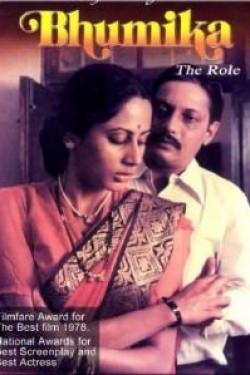Bhumika: The Role

Movie Info
Synopsis
Bhumika is a 1977 Indian film directed by Shyam Benegal. The movie stars Smita Patil, Amol Palekar, Anant Nag, Naseeruddin Shah and Amrish Puri. This film is broadly based on the memoirs of the well-known Marathi Stage and screen actress of the 1940s, 'Hansa Wadkar' who led a flamboyant and unconventional life and focus at an individual's search for identity and self-fulfillment. Smita Patil gave the strong performance of transforming herself in its course from a vivacious teenage girl to a wiser but deeply wounded middle-aged woman. The film won two National Film Awards and Filmfare Best Movie Award, it was invited to Carthage Film Festival 1978, Chicago Film Festival, where it was awarded the Golden Plaque 1978, and in 1986 it was invited to Festival of Images, Algeria.Wikipedia
Starring Cast
Bhumika: The Role Reviews
Audience Reviews for Bhumika: The Role
-
The question that kept springing in my head while watching this film was, "why did it take me so long to discover this?". I've watched most of Shyam Benegal's work and this one stands out as one of his finest pieces. Smita Patil was such a natural talent and her intensity in this role pierces through every frame. I couldn't help but regret that she isn't still here today to portray such powerful and meaningful female characters as she did in her short life. I can't think of one name who could fill her shoes today. Her graduation from a bubbly teenaged starlet who acts for a living to a middle aged actress who is struggling to keep it together while dealing with the pressures of fame and fractured relationships, is flawless. The cinematography by Govind Nihalani is so beautiful - esp. the black and white parts. The part when Smita realizes that she had yet again fallen into a trap (a literal one) by walking into yet another man's life, is so powerful and present, it makes you feel stifled with her.
It's ridiculous by today's degenerate standards that this film has an 'A' certificate and that explains why we never saw it on prime time television in the 80s or 90s. It is far more dignified and proper than any family film of the present.2October 02, 13













